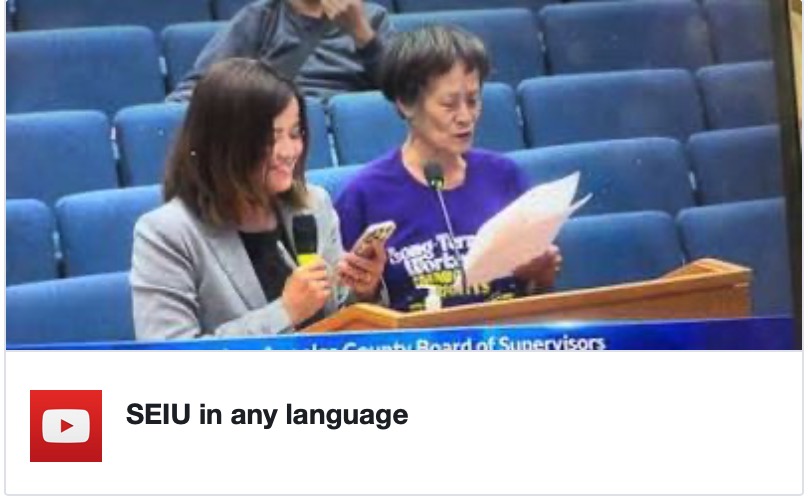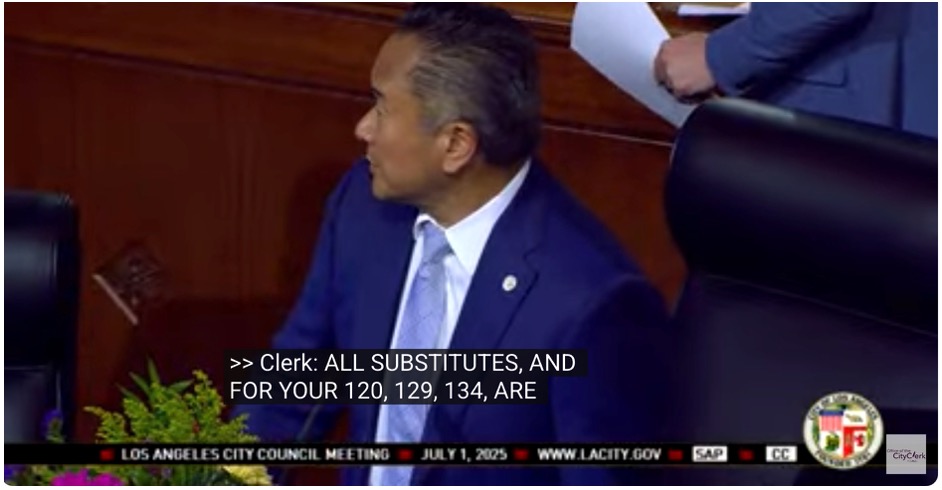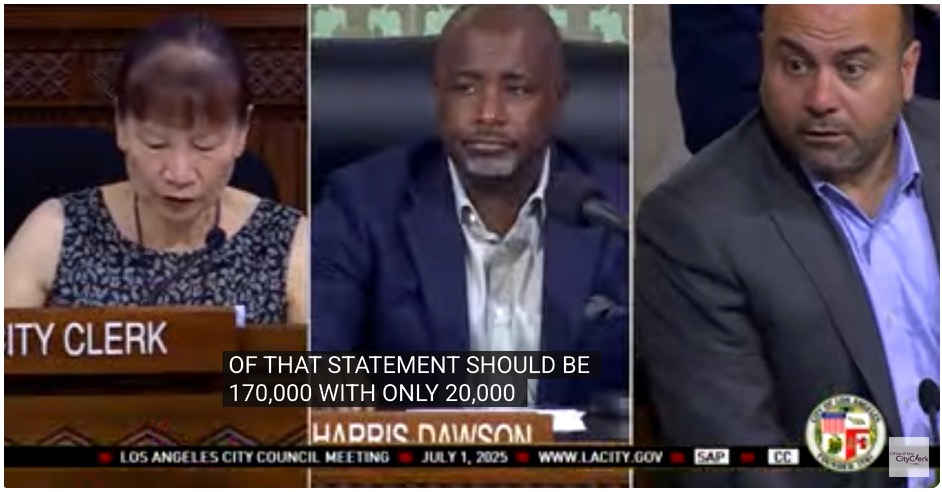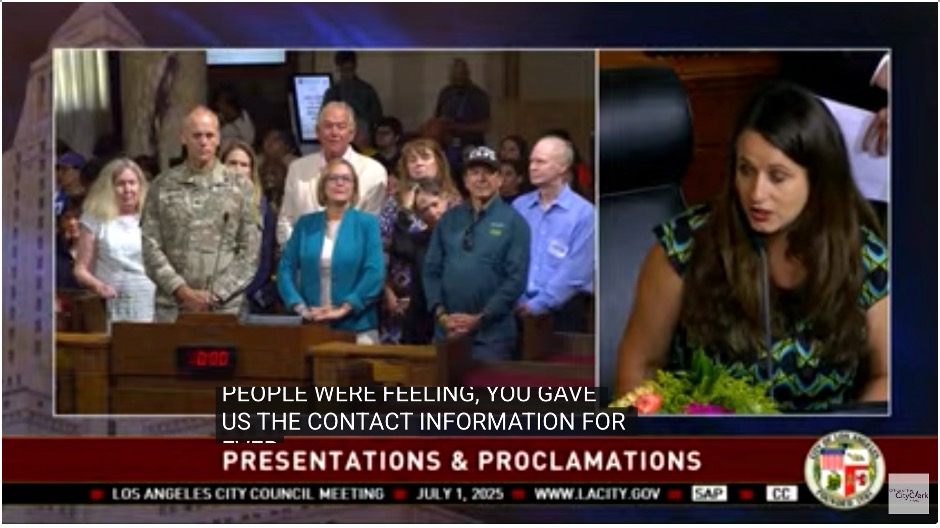Comments
ERIC PREVEN’S NOTEBOOK - The Los Angeles Dodgers, valued at $7.7 billion, pledged $1 million in June to help families targeted by ICE raids. Generous? Do the math: it’s 0.013% of their value, like someone with $100,000 giving thirteen bucks. Latino fans alone pour in $300 million a year, yet the team’s couch-cushion charity is framed as heroism.
Now, the Dodgers face a federal civil rights complaint from a conservative group attacking their DEI programs. Supervisor Lindsey Horvath called it “lawfare,” blaming a rogue federal administration for punishing them after they refused to help ICE.
Meanwhile, LA County Supervisors, who trip over themselves to back billion-dollar franchises, can’t spare similar support for SEIU care workers fighting for fair wages. In Los Angeles, billionaires get parades; frontline workers get stiffed.

A passionate public speaker at the county board meeting.
Public Hearing Items (1–11):
Item 4 covered LAX landside modernization. Items 8–11 were BID renewals for Little Tokyo, Gateway to L.A., West Adams, and Lincoln Heights Industrial Zone—all “authorized” after the perfunctory weighted ballot math was read aloud like solemn stock prices. No majority protests. No moral qualms.
Items 12–115:
Public hearings had been held elsewhere, out of earshot and out of mind. The Clerk noted Item 71’s amount correction ($450k, not $200k) and the Northwest Wood NC’s polite little support note for Item 100.
Items 116–150:
Public hearings not held so open to comment. Item 151 was a closed session.
Then came the specials and amendments scramble:
John Lee: Technical amendment to Item 114, substitutes for Items 120, 129, 134.

Councilmember Hutt: Revised ordinance to hike parking meter fees (Item 2), amendments to Item 108.
Nazarian: Technical funding adjustment on Item 32.

Rodriguez: Held Item 6, separate votes for Items 77, 113, 118.
Soto-Martinez: Separate votes for Items 15, 22, 23, 24, 27, 28, 30, 31, 56, 122; comments on Item 149.
Raman: Amendments to Items 81, 137; separate vote on 56.
Price: Amended Item 58, continued Item 123 to August 1, recused self from six items due to landlord conflicts and spouse’s employer ties.
Park: Amendments to Items 32, 113; comments on 139.
Blumenfield: Amendments to Items 58, 80; questions for Item 140 (closed session expected).
Hernandez: Amendment to Item 1; comments on Items 58, 84, 112, 144; separate vote for Item 18.
As the Clerk tallied the legislative roulette wheel, Traci Park took the floor for a very special presentation:
The Colonel Swenson Lovefest
Park delivered a soaring tribute to Colonel Eric Swenson of the U.S. Army Corps of Engineers for spearheading Pacific Palisades wildfire debris removal. Her speech read like a FEMA recruitment ad crossed with a Lifetime movie:
“12 people died, 6,837 structures destroyed, over 5,400 homes lost.”
Swenson’s Corps “carried out the fastest, safest, most community-integrated debris removal operations in California history.”
“He stood on burned properties and listened,” embodying that rarest of government qualities: presence.
Cue video montages, solemn music, tears, and a surprise cameo thank-you from the Secretary of the Army praising Swenson’s “speed of trust.” Swenson responded briefly, with Phoenix-from-the-ashes rhetoric even Smart Speaker found forgivable.
Councilmembers lined up for praise:
Rodriguez: “The embodiment of dedicated civil service,” contrasting his quiet heroism with LA’s “cheap politics.”
Padilla: Called him “Major Mark” and thanked him for defusing tense town halls.

Hernandez: Thanked him for rebuilding zip codes and offering hope.
Hutt: Praised his frontline leadership, recalling family ties to the Palisades.
Markeezy: Applauded him for “bringing the might of the U.S. government” with record speed.
After yet another standing ovation, they returned to business.
Immigration Terror & Julie’s Story
Councilmember Price introduced Guadalupe Gonzalez and her nieces to speak about Julie, abducted in broad daylight by unmarked federal contractors. Their testimony was wrenching:
ICE and Homeland Security denied any record of her detention.
Families searched detention centers across the region, finding others disappeared the same way.
Lupita (Guadalupe) decried life in terror without knowing if loved ones were dead or alive.
The council nodded solemnly. Then the Clerk, returning to procedure like an executioner cleaning the blade, read out items ready for roll call votes.
They vanished for an hour into closed session to discuss lawsuits and settlements, while channel 35 played highlight reels: councilmembers shaking hands with Olympians, planting saplings, holding pressers about safe streets as another pedestrian was maimed two blocks away.
Nothing to Report:
Council emerged from closed session like hungover gladiators blinking into daylight. President Markeezy called roll. Clerk responded with her usual ironed-flat affect. Nothing to report, which should be the City’s slogan.
Item 118 was reconsidered and re-voted in seconds, like a chicken nugget slingshot through committee. Mr. Price recused himself from Items 82, 111, and 112 (presumably because his mere presence risks ethical implosion). Item 112 was held briefly for Nazarian’s questions until Hernandez seized the floor to endorse the $424 million ULA expenditure plan, praising its “largest ever” outlay for housing justice: 10,000 tenants saved from eviction, 795 units advanced, $200 million for new social housing. ULA, she said, was fulfilling “the people’s will.”
Nazarian’s questions evaporated, and the merry go round continued:
Item 32: Amendment by Park, seconded by Lee, passed unanimously.
Item 58: The public bank feasibility study became a campaign rally. Hernandez raged against Wall Street’s grip on city finances, demanding public control over deposits. Blumenfield corrected her math: his $15k bump raised the pot to $60k to “get it done.” Passed with 15 ayes.
Councilmember Park then delivered a bitter monologue on Item 113, rebuking UNITE HERE’s smear campaigns against her minimum wage vote. Her amendment demanded that the City Attorney investigate both signature gatherers and withdrawal pushers:
“They told people to email me to stop it. I had nothing to do with it. No one even asked my opinion.”
Soto-Martinez responded coolly, reminding Park politicians “sign up to be mistreated and tarred and feathered,” while gig workers being assaulted was another matter. Hernandez tried redirecting blame to corporate backers. Rodriguez cut through with surgical nihilism:
“Such a joke. Everyone needs to grow the hell up. Voters need to be educated.”
Markeezy offered a final editorial, urging focus on national elections instead of local signature wars, because apparently potholes are trivial next to Wisconsin midterms.
The amendment passed with 12 ayes, 2 noes.
Signature Gathering Nostalgia
Watching their bureaucratic performance art unfold, I flashed back to the Historic Kickoff of candidate filing in November 2019 at Piper Tech: stacks of petitions, DMV-registered daughter signatures tossed out, the “large kerfuffle” outside Gelson’s when a 70-year-old hothead tackled a suspected shoplifter into the handicapped space.
“A large kerfuffle is not a Viktor Benes cookie. It’s a fight between a 70-year-old hothead and a suspected shoplifter.”
The only thing worse than gathering signatures is watching councilmembers ignore them. Like flowers wilting in the gutter after election day.
Public Comment: Slideshow
Next, the chamber plunged into a swirling storm of rage, heartbreak, profanity, and moral clarity. Roughly 20 speakers queued up in person to say it like it is. The mood? Furious. Righteous. Occasionally hilarious.
Item 140’s slur ban drew fierce rebuke. One woman, voice shaking, said:
“I detest the N-word. I won’t say it even in rap music. But it’s not your job to pick and choose which words we can’t say. There’s a thing called free speech – even speech we hate.”
She pivoted to ICE raids, warning the council that Scientology allegedly holds people’s visas hostage on L. Ron Hubbard Way. Her solution: “Put parking meters on L Ron Hubbard Way before raising them anywhere else.”
Another speaker, fresh off an overnight dishwashing shift, pleaded in Spanish and English to keep the Olympic wage ordinance:
“I’ve been up all night. I haven’t slept. I came straight here so you could hear me. I need to buy medication for my sick husband.”
One commenter ridiculed the agenda:
“This is like a textbook without a cover. The season finale of city council. Dozens of settlements crammed into the last day before recess. You’re lucky all we call you is cunts.”
Another condemned ICE raids as “masked men kidnapping our community,” demanding action while the council staged Pride lightings and posed for Olympic sailing pressers.
Then Lydia Ponce rose, standing on Tongva land:
“While you sit here worrying about insults like the N-word and C-word, children are crying down the street. Ripped from their parents or left behind. How dare you take an insult while you sit here collecting your six-figure paychecks.”
Scattered applause followed, quickly silenced by the city attorney and secret police, sorry sergeant-at-arms.
Other highlights:
– Accusations of corruption: closed session coverups, Covington & Burling’s invisible DOJ reports.
– Comedic scorn: council likened to a clown show of indicted felons and real estate shills.
– Bilingual rebuke in Cantonese and English mocking creeping authoritarianism.
Finally, tenant advocates demanded passage of the renoviction![]() loophole closure to stop landlord abuses. The ordinance passed, with Blumenfield taking a victory lap on what tenant groups spent years fighting for.
loophole closure to stop landlord abuses. The ordinance passed, with Blumenfield taking a victory lap on what tenant groups spent years fighting for.
Finally...
Public comment ended at 1:28 pm, boxed neatly into an hour of scripted democracy before the council pivoted to urgent items and self-congratulation.
They named Foliero Square after a beloved Highland Park pizza family.
They blocked disaster tourism buses from ogling Palisades fire rubble (Traci Park’s only decent motion all year).
They delayed the Right to Counsel vote.
They banned selected words– no action required today, held over one week to July 30 before adoption.
Then came adjourning motions:
They honored Reverend Hardwick, a South LA legend, and Brawn Levy, a Loyola High student killed by a drunk driver. His mother, Jen Levy, spoke with raw grief, calling for stricter DUI laws—the only moment that felt truly real.
Finally, Council President Harris-Dawson banged the gavel:
“We are adjourned. Happy recess.”
Councilmembers shuffled papers, and staff tried to make sense of the debris without old Swenson. Potholes remained unfilled, but the chamber felt lighter as they vanished for summer.
Because if one theme echoed through public comment, it was this:
“Your fight isn’t in Washington. It’s here, with the people. The struggle is here. The pain is right in front of you.
County Line:
Moderator: Our first participant is Eric Preven. Your line is open. If you are muted, please unmute and speak directly into your phone. You may begin.
Smart Speaker: Okay, thank you. So the problem is this is a closed session. We have no idea what's really going on. One of the firms that you've been conspiring with in the back room, Covington and Burling—upscale law firm, Eric Holder worked there, made $2,500 an hour. Not a bad rate compared to the hardworking IHSS workers. They do a great whitewash program. Now the City of L.A. across the street has put them under contract for up to $500,000 to fight federal investigations. Here's my concern? What the hell is going on? Which federal investigations and why—
Dawyn Harrison, County Counsel: This is public comment on closed session items only. Can you please keep your comment —
Smart Speaker: How do I know? It's closed, I assume that's where you talk with Covington? Come on, Barger, you can't interrupt the guy that's talking about the lawyers.
Supervisor Kathryn Barger, Chair: That was not me, but I will. Stick to what's on closed session.
Smart Speaker: Closed session is top secret, but I'm happy to talk about labor relations—Care cannot wait anymore. (El cuidado ya no puede esperar.)
Executive Officer: Next speaker, please.
Smart Speaker: What's that?
Supervisor Kathryn Barger, Chair: Thank you, Mr. Preven.
Smart Speaker: Hang on, that's not going to cut it to interrupt the fellow in the middle of his remarks.
Executive Officer: Moderator, next speaker, please.
Moderator: Eric Preven, your line is open. You may begin.
Smart Speaker: Thank you. Can you hear me?
Moderator: Yes, go ahead.
Go ahead, Eric.
Smart Speaker: Okay, this is a public comment—quiet Pickles. I'm going to follow up on my prior remarks because I'm concerned about a closed session that's almost six hours in duration. I guess some of it's labor—(dog barking)—labor discussions, which is fine, but how about pay the people a reasonable wage, Davenport? Given the fact that we have, you know, all y'all—including mom and pops—including insurance companies, everybody is crying poor. Everybody, so the people who are actually taking care of the humans, the caregivers, ought to be paid fairy.
This is—Bullshit—they need the small incremental raise they've been denied since the beginning of the year, and people know that. So I think it's time to find a way to move a few things around and take care of it. They're saving us a fortune.
In addition to that, I would like to say something about the many buses we need—[inaudible]—and the plan to get hundreds of buses up in here.
Executive Officer: Thank you, next speaker, please.
(Eric Preven is a Studio City-based TV writer-producer, award-winning journalist, and longtime community activist who won two landmark open government cases in California.)










